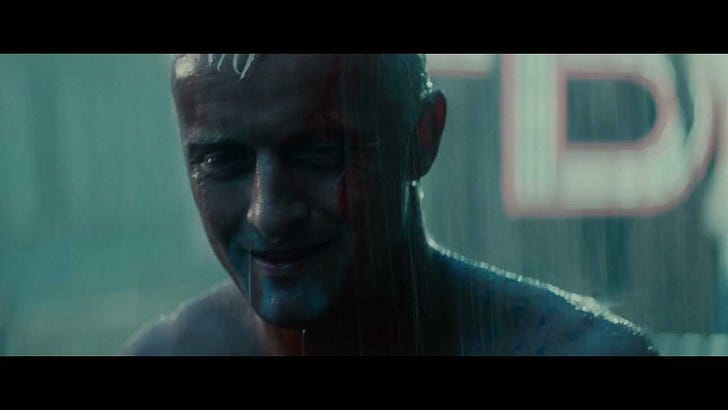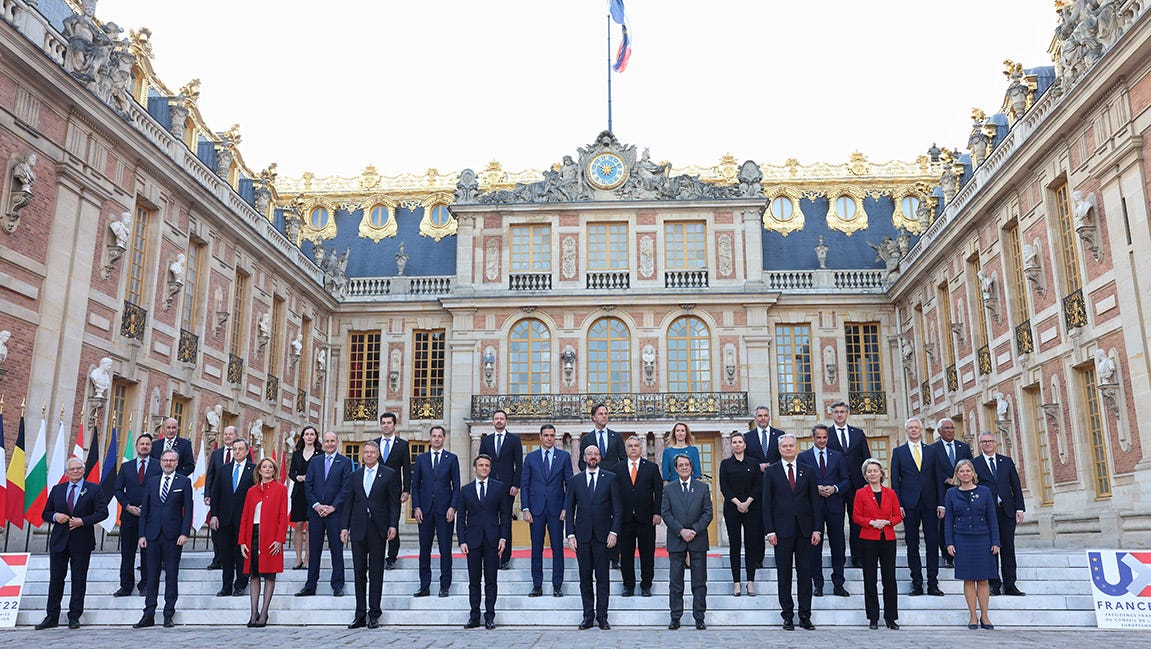Fault Lines #4: Europe Transformed
The war in Ukraine may finally give birth to a geopolitical European Union
My sincere apologies for the long hiatus since the last edition. It has been difficult to write about Ukraine in a way that cuts through the fog of war.
The war will change Europe more than anywhere else, so that will be my focus for the next while, drawing on the lessons of how the EU has responded to the many crises that have preceded this one - the gravest of them all.
I've seen things, you people wouldn't believe.
All those moments, will be lost in time like tears in rain.
Germany Turns
The reluctance to historicize current events has been swept away by Russia’s invasion of Ukraine. In the past two weeks, we have seen things we thought we would never witness again on European soil.
If in Konrad Adenaeur’s words, history is the sum total of things that could have been avoided, then Putin’s war of choice has forced the EU to confront a set of questions that it has spent the past decade trying its best to avoid.
Decisions that would have been unthinkable before February the 24th have been made at a dizzying speed and scale. Germany’s new Chancellor Olaf Scholz has been at the vanguard; abandoning shibboleths of German foreign and defence policy in his 'Zeitenwende' speech to the Bundestag on February 27th, where he announced the doubling of German defence spending and the export of lethal weapons to Ukraine.
In German, ‘Wende’ means a transition or turning point, and ‘Wendepolitk’ has long been a leitmotif of German politics. The fall of the Berlin Wall in 1989 German reunification the following year is known as ‘Die Wende’. Angela Merkel’s ‘Energiewende’, the fateful decision to shutter nuclear power and double down on Russian gas, has undermined efforts to fully cut off all sources for hard currency to Putin.
Abandoning decades of ‘Ostpolitik’, which sought normalisation of relations with the Soviet Union and subsequently Russia, latterly through trade, Scholz propelled Germany into becoming the third-largest spender on defence globally, behind only the US and China.
When Germany turns, Europe is remade. In place of the mercantile incrementalism of the Merkel era, it seems for now at least that everything is up for grabs. What does the experience of the ‘polycrisis’ of the past decade tell us about the kind of Europe that will be forged in the shadow of Russia’s invasion of Ukraine?
A Permafrozen Polycrisis
This European Union has faced its worst economic, financial and social crisis since World War II. And it is still struggling with the consequences. I have often used the Greek word 'polycrisis' to describe the current situation. Our various challenges – from the security threats in our neighbourhood and at home, to the refugee crisis, and to the UK referendum – have not only arrived at the same time. They also feed each other, creating a sense of doubt and uncertainty in the minds of our people.
When the then President of the European Commission, Jean-Claude Juncker, first presented the concept of the ‘polycrisis’ in a speech on the 21st of June 2016, Europe was coming towards the end of a turbulent decade, that commenced with the 2008 global financial crisis. Brexit and Trump were just around the corner. Covid was still on the event horizon.
Juncker’s recognition of the interlocking nature of these crises and their cascading effects reads in part as an apologia for the failings of the European institutions, including the one he presided over.
As I wrote in Fault Lines #3, such introspection in the wake of the polycrisis is now common currency among policymakers who were at the heart of the action. As early as 2007, when Prime Minister of Luxembourg and President of the Eurogroup, Juncker famously commented, "We all know what to do, but we don’t know how to get re-elected once we have done it." What became known as the 'Juncker Curse' spoke to a European politics that was frozen as history itself was thawing from the cold storage of its long post-1989 slumber.
Underpinning Europe’s flawed response to the polycrisis was its inability to mediate between the democratic politics of its members. In the years before and after 2016, Europe was suspended between German resistance to reducing its trade surpluses and developing a greater fiscal capacity and French aspirations to transform the EU into a puissance — a strategic power with fiscal and defence capabilities.
Nothing epitomised this stalemate so much as Merkel’s year-long silence following Macron’s 2017 Sorbonne speech where he laid out his vision of a sovereign and strategic Europe. The Chancellor was unmoved by the French President’s pursuit of European grandeur. As the polycrisis magnified, Europe’s politics were permafrozen.
The Levee Breaks
If it keeps on rainin', levee's goin' to break
If it keeps on rainin', levee's goin' to break
When the levee breaks, I'll have no place to stayCryin' won't help you, prayin' won't do you no good
No, cryin' won't help you, prayin' won't do you no good
When the levee breaks, mama, you got to move, ooh
The early days of the pandemic in March 2020 revealed the deeply ingrained nature of Europe’s political stalemate. ECB President Christine Lagarde asserted that the central bank was “not here to close spreads” between the borrowing costs of member states, Italy was refused stocks of PPE, and national travel and entry rules dominated.
Reeling from the outcry over her remarks, Lagarde quickly shifted 180 degrees by going beyond Draghi’s “whatever it takes” with a programme of asset purchases that demonstrated in her words that there were “no limits” to the ECB’s commitment to the euro.
Once again, the monetary authority was putting it up to governments to act. The initial instinct of Germany and its ‘frugal’ allies was to resist despite calls from an alliance of nine member states for a "common debt instrument" to help governments repair the economic damage done by the pandemic. Berlin insisted any recovery plan must consist of short-term, repayable loans. For a time it seemed that even the pandemic could not unblock Europe’s stalemate.
The levee broke with the decision of the red-robed justices of the German Supreme Court in Karlsruhe that cast doubt on the legality of the ECB’s previous asset purchase programmes. The ball had firmly been placed in Merkel’s court: reliance on the ECB alone would not be sufficient to overcome this crisis.
Merkel had to move. Just under two weeks later, on May 18th 2020, she announced a plan for a €500 billion fund to be financed by joint borrowing at a press conference with Macron. Despite a concerted attempt to push back against this by Germany’s frugal allies, what is now the more than €800 billion ‘NextGenerationEU’ recovery fund, was agreed by all 27 leaders that July.
While the recovery fund is temporary, it was made part of the EU budget - meaning that the Commission could develop sources of revenue to part-fund it and that receipt of funds could be made conditional on compliance with rule of law conditions, with an eye to Hungary and Poland.
Though NextGenerationEU was forged in the Covid moment, it is in reality a growth policy to transform the EU’s economy towards the digital and energy transition. Ahead of the Versailles summit last week, France began to suggest the need for a second recovery fund - this time to fund defence capabilities and a rapid move away from Russian gas. However, the deficit in European defence is not spending, which at 1.5% of EU states' economic output is close to the 2% NATO spending goal, but the fact that this falls well short of the sum of its parts due to a failure to collaborate.
What is significant about the moves now underway to develop more joint borrowing is not what this is intended to fund, as much as the potential this creates to embed joint borrowing along with fiscal and revenue-raising capacity as a permanent feature of the EU. Will the polycrisis witness a permanent political thaw?
War By Other Means
No longer were there individual destinies; only a collective destiny, made of plague and emotions shared by all.
Albert Camus, The Plague
Russia’s war of aggression constitutes a tectonic shift in European history. At our meeting in Versailles we discussed how the EU can live up to its responsibility in this new reality, protecting our values, our democracies, the safety of our citizens and our European model. For the past few years, we have been engaging in a green and digital transition which requires considerable investments and regulatory evolutions. Faced with the COVID pandemic, we acted with solidarity to provide vaccines and we adopted a historic recovery plan to support our citizens and businesses collectively.
Confronted with growing instability, strategic competition and security threats, we decided to take more responsibility for our security and take further decisive steps towards building our European sovereignty, reducing our dependencies and designing a new growth and investment model for 2030.
European Council, Versailles declaration, 10 and 11 March 2022
Make no mistake about it: the EU is at war with Russia, whether it is through the provision of lethal weapons or the extraordinary economic sanctions that have been imposed.
Because the EU isn’t a state and therefore lacks the democratic consent to wage war or the revenue sources to properly finance this, it is being prosecuted through decisions hastily agreed at meetings of various EU ministers and leaders. Coordination and solidarity have never been so unanimous and public support for radical action is high.
Long-standing positions are being dropped and resistance to what was previously off-limits has melted away. Witness the Visegrad states of Poland, Hungary, Czechia and Slovakia, until now adamantly opposed to opening the EU’s borders to people fleeing war, but now arguing strongly for it.
Witness also how fast policy is shifting on Common European defence - particularly in those states that have previously insisted on carve-outs, like Denmark:

While public opinion in neutral states like Ireland shifts decisively in favour of EU solidarity on defence:
Public opinion in Germany is now decisively in favour of doubling down on cutting off any source of revenue for Putin’s war machine:

What Luuk VanMidelaar calls 'events politics' are in full swing, the necessary condition for a decisive shift in the political trajectory of the EU. What is less apparent is how the EU can develop the capabilities to match the aspirations of Versailles in a way that accommodates the domestic politics of each member state. Much of what is being proposed still rests on the same insouciant assumptions and member state preferences that have bedevilled previous attempts to make the EU a significant global actor.
What favours a European ‘Wendepunkt’ or turning point is that the alternative of drift, fraction and the continuation of frozen politics is now an existential risk to the EU’s security, energy and economic future in a way that it has never been before.
The polycrisis is permanent. The levee has broken wide open. It is time to move.
In forthcoming editions, I will explore how the EU can make a reality of its aspiration to become a great power.





